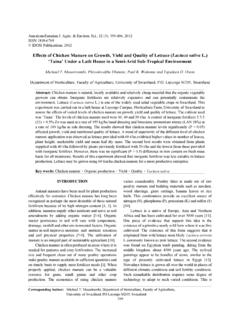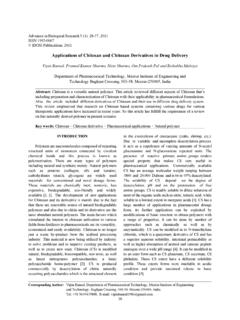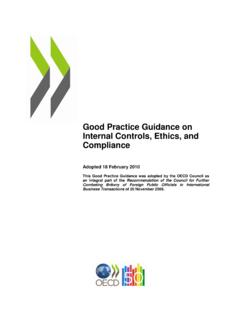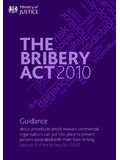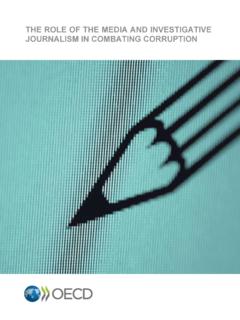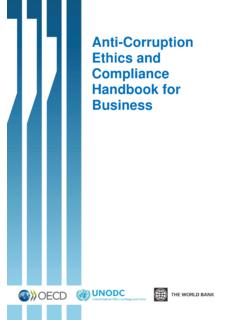Transcription of CORRUPTION AND DEVELOPMENT IN AFRICA: CHALLENGES …
1 Humanity & Social Sciences Journal 2 (1): 01-07, 2007 ISSN 1818-4960 IDOSI Publications, 2007 Corresponding Author:Dr. Gbenga Lawal, Department of Political Science, Olabisi Onabanjo University, Ago-Iwoye,Ogun State, Nigeria1 CORRUPTION and DEVELOPMENT in Africa: CHALLENGES for Political and Economic ChangeGbenga LawalDepartment of Political Science, Olabisi Onabanjo University, Ago-Iwoye, NigeriaAbstract: DEVELOPMENT is seen as the process by which a type of (social) change is introduced intoa system in order to produce a better production method and improved social arrangement. It involvesa structural transformation of the economy, society, polity and culture of a country. The level and rateof DEVELOPMENT of any particular society is influenced by so many variables such as the politicalculture, leadership and CORRUPTION . In Africa, CORRUPTION has been at the centre of DEVELOPMENT animpediment of true and real DEVELOPMENT in the society.
2 CORRUPTION has ravaged the entire Africansystem, causing the continent to be the most corrupt in the world. If Africa is to be saved from thisinfection, the endemic presence of CORRUPTION must be dealt with. This paper therefore addresses theimplication and impact of CORRUPTION in Africa and on African DEVELOPMENT ; and suggested a wayforward for the desired change. Key words: CORRUPTION % Africa % DevelopmentINTRODUCTIONC orruption exists throughout the world, in developed and developing countries alike. In recent years there have beensignificant increases in the attention paid to CORRUPTION , in part due to (I) series of high level CORRUPTION cases inindustrialized countries and (2) due to an increasing awareness of the costs of CORRUPTION throughout the world and (3) dueto the political and economic changes which many countries are undergoing. CORRUPTION in Africa is a DEVELOPMENT countries cannot bear the costs of CORRUPTION , which impedes DEVELOPMENT and minimizes the ability ofgovernments to reduce poverty.
3 Effectively addressing CORRUPTION in African countries has become a developmentimperative [1].Corrupt practices span a wide spectrum, ranging from petty CORRUPTION whereby bribes are required before normalbureaucratic procedures are accomplished, to large scale CORRUPTION whereby considerable sums of money are paid in returnfor preferential treatment or access. CORRUPTION occurs in the political, economic and administrative spheres. Corruptionis worse in countries where institutions, such as the legislature and the judiciary are weak, where rule of law and adherenceto formal rules are not rigorously observed, where political patronage is standard practice, where the independence andprofessionalism of the public sector has been eroded and where civil society lacks the means to bring public pressure tobear. Once CORRUPTION becomes entrenched, its negative effects multiply. It induces cynicism, because people begin to regardit as the norm.
4 It undermines social values because people find it easier and more lucrative to engage in CORRUPTION than toseek legitimate employment. It erodes governmental legitimacy because it hampers the effective delivery of public goodsand services. It limits economic growth because it reduces the amount of public resources, discourages private investmentand saving and impedes the efficient use of government revenue and DEVELOPMENT assistance funds [2]. Humanity & Social Sci. J., 2 (1): 01-07, 20072 Strategies to limit CORRUPTION have to be realistic and achievable and tailored to the needs of particular countries. Inorder words, policies intended to address CORRUPTION have to be consistently implemented over the long term. Corruptionis essentially a governance issue. Increased governmental accountability and transparency, enhanced public participationin decision making, strengthened public sector and civil society institutions and greater adherence to the rule of law willnot only improve governance but will help counter CORRUPTION .
5 Free and open competition is ultimately the greatest weaponagainst corrupt practices - whether political, economic or bureaucratic [3].At the national level, specialized agencies and anti- CORRUPTION bodies can be extremely effective, but only providedthat they have sufficient independence, authority and resources to function efficiently. Government actions alone will notbe effective. A broad coalition against CORRUPTION , encompassing governments and the public, is necessary. In this,organisations and society, the press and the business sector all have a crucial role to play. Public opinion has to besupportive to anti- CORRUPTION efforts and public opinion is the major force in creating an environment in which corruptionis not accepted or condoned. Public education as to the detrimental effects of CORRUPTION is important in creating publicawareness and an active public response in support of anti- CORRUPTION measures.
6 For this, free and professional press andmedia and accessible channels of information, are crucial [4].While the ultimate responsibility of combating CORRUPTION lies with countries themselves, there is a role for bothregional cooperation and international support. Many corrupt practices are localized or are confined within the boundariesof individual countries. Many more, however, are not. International business transactions have long been recognized asfertile ground for CORRUPTION . Much of the money gained as a result of corrupt practices is kept in safe havens outside ofAfrica. Some parties to corrupt activities may be based in neighbouring countries and those accused of CORRUPTION oftensimply move to other countries to avoid prosecution. Regional cooperation and DEVELOPMENT of regionally agreed legalmechanisms to address these problems would be useful, while international efforts to stop large scale CORRUPTION in businesstransactions are is now recognized as a global phenomenon, which has to be addressed coherently and consistently.
7 Theneed for concerted action in Africa is evident. African countries have to become more integrated into the global economyand attract greater levels of foreign and domestic investment if they are to achieve the growth rate necessary to reducepoverty and improve the well being of their populations. Though, these will only make it possible to limit and notaltogether eradicate CORRUPTION and to reduce the corrosive effects it has on African nations and societies. This paper therefore provides an overview of CORRUPTION and the consequences of corrupt practices in Africa as thesealso affect and hinder political and economic DEVELOPMENT in Africa. It also discusses measures which have to beimplemented at reducing the acts and consequences towards achieving a desired political and economic CLARIFICATIONC orruption: CORRUPTION is a term that has been perceived in various ways by various scholars. Its conceptualisation hasattracted in recent past competing and numerous views and approaches.
8 It is therefore seen as a worldwide phenomenonwhich has long been with every society in the world. It has been identified as the bane of most political and economicproblems in societies [5]. CORRUPTION is again considered as an enemy of economic DEVELOPMENT because of its various nation that condones CORRUPTION is often besieged with a lot of economic, political and social vices. Khan (1996) defines CORRUPTION as an act which deviates from the formal rules of conduct governing the actions ofsomeone in a position of public authority because of private - regarding - motive such as wealth, power or status [6]. CORRUPTION is the perversion of integrity or state of affairs through bribery , favour or moral depravity .. It takesplace when at least two parties have interacted to change the structure or processes of society or the behaviour offunctionaries in order to produce dishonest, unfaithful or defiled situations [7].
9 In other words - CORRUPTION is a systematicvice in an individual, society or a nation which reflects favouritism, nepotism, tribalism, sectionalism, undue enrichment,amassing of wealth, abuse of office, power, position and derivation of undue gains and benefits. CORRUPTION also includesHumanity & Social Sci. J., 2 (1): 01-07, 20073bribery, smuggling, fraud, illegal payments, money laundering, drug trafficking, falsification of documents and records,window dressing, false declaration, evasion, underpayment, deceit, forgery, concealment, aiding and abetting of any kindto the detriment of another person, community, society or nation [8]. Again careful study of the presentation of Otiteshows that CORRUPTION transcends bribery but includes treasury looting and also the deliberate bending of rules of thesystem to favour friends or hurt foes. It is clearly the evidence of absence of accountability, law and order. CORRUPTION exists everywhere in the world and it becomes the norm particularly if the chances of being caught andseverely punished are low and if it is a generally accepted or tolerated mode of behaviour.
10 CORRUPTION in Africa is adevelopment and social issue which becomes an impediment to change and a serious constraint on economic growth andpoverty reduction. CORRUPTION in African countries has become endemic, as such, it is found almost in all aspects of CORRUPTION implies a breakdown of the rule of law and in most instances a loss of state legitimacy. It perverts thenormal use of connections, networks and reciprocity and leads to increased personalization of power. As a result, peoplecome to rely on connections and favours instead of formal political, social and economic rules and illegitimate use of stateresources becomes acceptable. Where corrupt practices have become entrenched, large scale CORRUPTION by whichgovernment officials amass large fortunes co-exists with petty CORRUPTION by which officials at almost every level requestpayment to perform tasks or provide services which they should be doing as part of their job.
